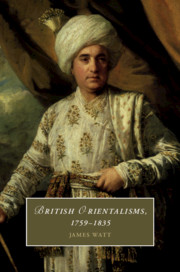Book contents
- British Orientalisms, 1759–1835
- Cambridge Studies in Romanticism
- British Orientalisms, 1759–1835
- Copyright page
- Contents
- Acknowledgements
- Introduction
- Chapter 1 ‘Those Islanders’
- Chapter 2 ‘Indian Details’
- Chapter 3 ‘All Asia Is Covered in Prisons’
- Chapter 4 ‘In Love with the Gopia’
- Chapter 5 ‘Imperial Dotage’ and Poetic Ornament in Romantic Orientalist Verse Narrative
- Chapter 6 Cockney Translation
- Chapter 7 ‘It Is Otherwise in Asia’
- Conclusion
- Bibliography
- Index
- Cambridge Studies in Romanticism
Conclusion
British Orientalisms, Empire, and Improvement
Published online by Cambridge University Press: 31 July 2019
- British Orientalisms, 1759–1835
- Cambridge Studies in Romanticism
- British Orientalisms, 1759–1835
- Copyright page
- Contents
- Acknowledgements
- Introduction
- Chapter 1 ‘Those Islanders’
- Chapter 2 ‘Indian Details’
- Chapter 3 ‘All Asia Is Covered in Prisons’
- Chapter 4 ‘In Love with the Gopia’
- Chapter 5 ‘Imperial Dotage’ and Poetic Ornament in Romantic Orientalist Verse Narrative
- Chapter 6 Cockney Translation
- Chapter 7 ‘It Is Otherwise in Asia’
- Conclusion
- Bibliography
- Index
- Cambridge Studies in Romanticism
Summary
At the beginning of his 1840 essay ‘Lord Clive’, Macaulay lamented that ‘the great actions of our countrymen in the East should, even among ourselves, excite little interest’. Macaulay’s various writings and speeches on India in many respects provide an appropriate end point now, not least because they recognize the significance of the era of the Seven Years’ War with which this book began. Echoing Richard Owen Cambridge’s reference to how ‘a handful of Europeans’ subdued ‘a multitude of Asiatics’, Macaulay in his 1833 speech on the renewal of the EIC charter described the remarkable conquest of India by ‘a handful of adventurers from an island in the Atlantic’ who ‘subjugated a vast country’. He reprised this story of Britain’s accession to power in Bengal in his essays on Clive and Warren Hastings, while at the same time accentuating the claim which he made in his earlier speech that the ‘character’ of ‘Hindoos’ qualified them only to be the subjects of an enlightened despotism. Adapting the typificatory discourse of Hockley’s Pandurang Hari, Macaulay declared in his essay on Clive that ‘the Bengalee … shrinks from bodily exertion; and though voluble in dispute, and singularly pertinacious in the war of chicane, he seldom engages in a personal conflict, and scarcely ever enlists as a soldier.’ The conclusion which Macaulay drew from this sketch of ‘Bengalee’ effeminacy was that ‘[t]here never, perhaps, existed a people so thoroughly fitted by nature and by habit for a foreign yoke.’
- Type
- Chapter
- Information
- British Orientalisms, 1759–1835 , pp. 260 - 266Publisher: Cambridge University PressPrint publication year: 2019



